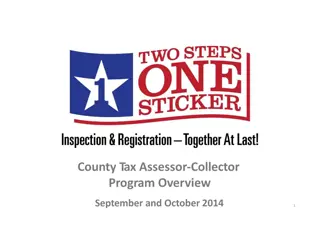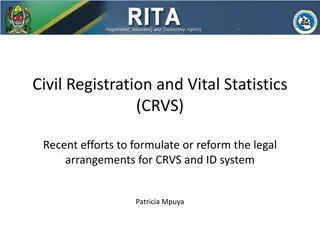
Firm Registration_ A Comprehensive Guide to Starting Your Business Legally
Starting a business is an exciting venture, but it requires proper legal formalities to ensure smooth operations. One of the most crucial steps in setting up a business in India is firm registration. Whether you are a sole proprietor, in a partnershi
Download Presentation

Please find below an Image/Link to download the presentation.
The content on the website is provided AS IS for your information and personal use only. It may not be sold, licensed, or shared on other websites without obtaining consent from the author. If you encounter any issues during the download, it is possible that the publisher has removed the file from their server.
You are allowed to download the files provided on this website for personal or commercial use, subject to the condition that they are used lawfully. All files are the property of their respective owners.
The content on the website is provided AS IS for your information and personal use only. It may not be sold, licensed, or shared on other websites without obtaining consent from the author.
E N D
Presentation Transcript
Firm Registration: A Comprehensive Guide to Starting Your Business Legally Introduction Starting a business is an exciting venture, but it requires proper legal formalities to ensure smooth operations. One of the most crucial steps in setting up a business in India is firm registration. Whether you are a sole proprietor, in a partnership, or establishing a private limited company, registering your firm provides legal recognition and several benefits, including access to financial aid, credibility, and legal protection. In this article, we will explore the various types of firm registration in India, the required documents, the registration process, and the benefits of legal compliance. Types of Firm Registration in India Depending on the nature of the business, entrepreneurs can choose from different types of firm registrations: 1. Sole Proprietorship Registration A sole proprietorship is the simplest form of business, where one individual owns and manages the company. This type of business does not require formal registration, but the proprietor must obtain necessary licenses such as GST registration, Shop and Establishment Act registration, or MSME registration.
2. Partnership Firm Registration A partnership firm is a business structure where two or more individuals come together to run a business under a shared agreement. Registration of a partnership firm is governed by the Indian Partnership Act, of 1932, and while it is optional, a registered partnership has legal advantages in case of disputes. 3. Limited Liability Partnership (LLP) Registration An LLP combines the flexibility of a partnership with the benefits of limited liability. It is registered under the Limited Liability Partnership Act, 2008, and requires mandatory compliance with the Ministry of Corporate Affairs (MCA). 4. Private Limited Company Registration A private limited company is a separate legal entity distinct from its owners. It is registered under the Companies Act, 2013, and provides limited liability protection, making it a preferred choice for startups and growing businesses. 5. One Person Company (OPC) Registration For entrepreneurs who wish to operate as a single entity but want limited liability, an OPC is a great option. It combines the benefits of sole proprietorship and corporate structure, requiring compliance with the Companies Act, 2013. 6. Public Limited Company Registration A public limited company can raise capital from the public through the stock market. It is governed by the Companies Act, 2013, and requires compliance with stringent regulatory frameworks. Documents Required for Firm Registration The necessary documents for firm registration depend on the type of entity being registered. However, common documents include: 1. Identity Proof: PAN Card, Aadhar Card, Passport, or Voter ID of the business owners. 2. Address Proof: Utility bills, rental agreements, or property documents of the business location. 3. Partnership Deed/Memorandum & Articles of Association (MOA/AOA): Required for partnership firms and companies. 4. GST Registration Certificate: Mandatory if the business turnover exceeds the prescribed limit. 5. Bank Account Details: Business bank account statement for financial transactions. 6. Digital Signature Certificate (DSC): Needed for online registration of companies and LLPs. 7. Director Identification Number (DIN): Required for company directors.
8. Additional Licenses: Depending on the business nature, trade licenses, FSSAI registration, and others may be needed. Step-by-Step Process for Firm Registration 1. Choose the Business Structure Determine the type of firm that best suits your business objectives and legal requirements. 2. Obtain a Digital Signature Certificate (DSC) and Director Identification Number (DIN) For company and LLP registrations, the DSC and DIN must be obtained from the MCA. 3. Name Reservation Apply for name approval through the MCA portal for companies or the Registrar of Firms for partnership firms. 4. Drafting of Partnership Deed or MOA & AOA For partnership firms, a partnership deed must be created. For companies, the Memorandum and Articles of Association are required. 5. Submission of Registration Forms Complete the firm registration forms online via the MCA or state-specific portals. 6. Verification and Approval The authorities verify the submitted documents. If everything is in order, the registration certificate is issued. 7. GST Registration & Other Licenses Register for GST, professional tax, and any other applicable licenses required for your business. 8. Open a Business Bank Account Once registration is complete, open a bank account in the firm's name for business transactions. Benefits of Firm Registration Legal Recognition: Provides legal status to the business and ensures compliance with the law. Limited Liability: In the case of LLPs and private limited companies, owners' assets are protected from business liabilities. Credibility & Trust: A registered business gains the trust of customers, investors, and financial institutions. Tax Benefits: Enables eligibility for tax deductions and exemptions. Easier Fundraising: Registered firms can raise funds through bank loans, investors, and government schemes. Perpetual Succession: For companies, the business continues even if the owner changes. Conclusion Firm registration is a crucial step toward legalizing and securing your business operations. Whether you are starting as a sole proprietor, forming a partnership, or establishing a private limited company, choosing the right business structure and completing the necessary registrations will pave the way for growth and success.
By following the right process and ensuring compliance with legal requirements, you can build a strong foundation for your business, gain credibility, and access financial opportunities. If you re unsure about the process, consulting with a professional or a legal expert can help streamline the registration journey. Register your firm today and set your business on the path to success!






















